Strategies for Career Development: How to Grow Your Career
First, what does it truly mean to grow your career? I have realized that to grow our careers, we need to first grow ourselves. As someone who has experienced her share of transformation and is still experiencing it, some very intriguing learning principles have continued to guide me and could guide you too. I derived these learning principles through my reading of Scott Young’s book, Ultralearning. All the principles he explained in the book are my favorites, and I am very eager to share them with you. Although there are several other books similar to this, in Josh Waitzkin’s The Art of Learning, the principles I want to allure you to are those I deduced from Scott Young’s Ultralearning.
If I may introduce you to the central notion of the book, Scott will coach you on how to learn very quickly and strategically by deciding what you plan to learn and staying completely committed to it for some time until you are transformed beyond your limits. That is the reason for the name, Ultralearning. Think of it as an ultramarathon.
First Principle: Meta-learning: Draw a Map First
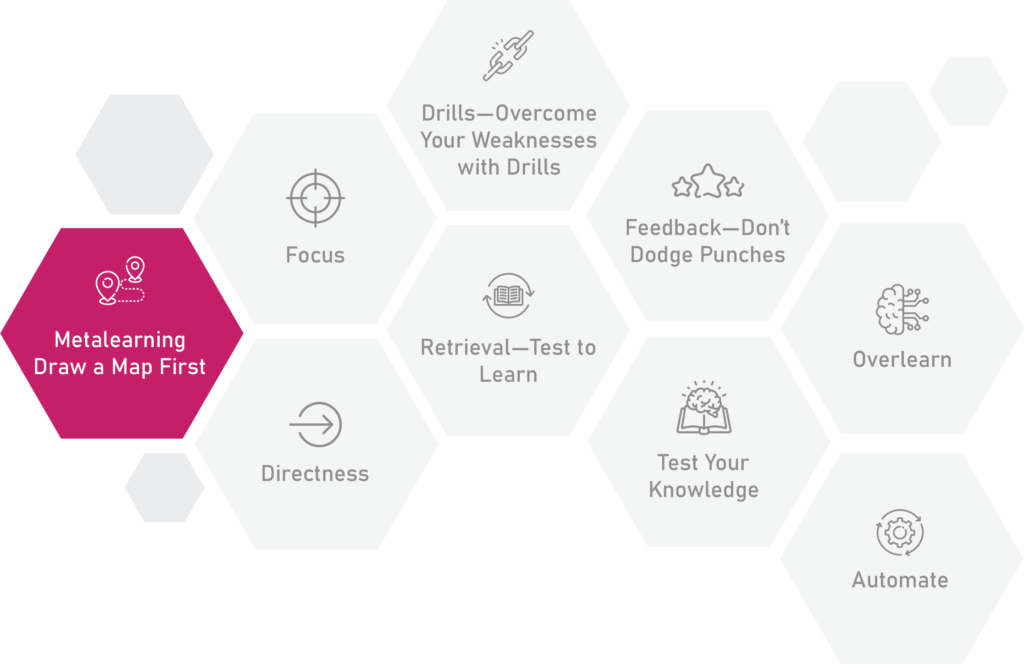
Scott Young tagged the first principle, meta-learning. This means that if you want to learn a new skill, you should first learn how to best approach learning the skill. If you plan to learn a language, for instance, taking time to do research could lead you to the right approach. As Scott Young puts it, “Meta-learning forms the map, showing you how to get to your destination without getting lost.” This is similar to using a GPS to get to a destination. Similarly, you need a road map if you want to attain a certain level of leadership and responsibility in your career. But before then, you need to first know how to approach learning the skills that will lead to your career advancement.
First, you must understand “why” you want to attain that level of leadership and responsibility, and thereafter, you need to search for people who can tell you the skills that are required for that level of career growth and advancement. They could be mentors, experts, and/or professionals who have reached the top in a similar career path. The reason you need these people is based on the fact that you need to collect data from them to draw your meta-learning map or your meta-learning approach. You should also know “what” you will need to acquire to be successful. They could be knowledge and abilities.
Scott Young says there are three types of things to learn:
- Concepts to understand (e.g., to learn Python, you must understand key concepts like commands, variables, loops, and conditions)
- Facts to memorize (if you aim to work fast, you wouldn’t have time to frequent the library or use Google) (For instance, a language learner must understand vocabulary, pronunciation, and grammar.)
- Motions to train.
What is meant by motions to train?
If I’m a coder or software engineer, for example, the speed at which I’m able to work or retrieve knowledge is a result of the motions I’ve trained. My speed will be dependent on the motions I’ve trained. This means that there are things to be understood or practiced over and over again. Motions determine how fast you can execute certain things.
Based on the above-mentioned, we can proceed to categorize learning into three types:
- Things to explain (we learn through explanation)
- Facts to memorize (you learn by repetition and rehearsal)
- Procedures to motion (you learn through drills or continuous practice until something becomes a part of you).
Now, it should be clear why I said that growing our careers is just the same as growing ourselves. This type of learning principle, meta-learning, helps you understand how to approach your growth differently. This strategy can help you create a solid career plan. As soon as you understand the concepts, facts, and processes involved in learning something, you can start drawing a learning map.
Second Principle: Focus
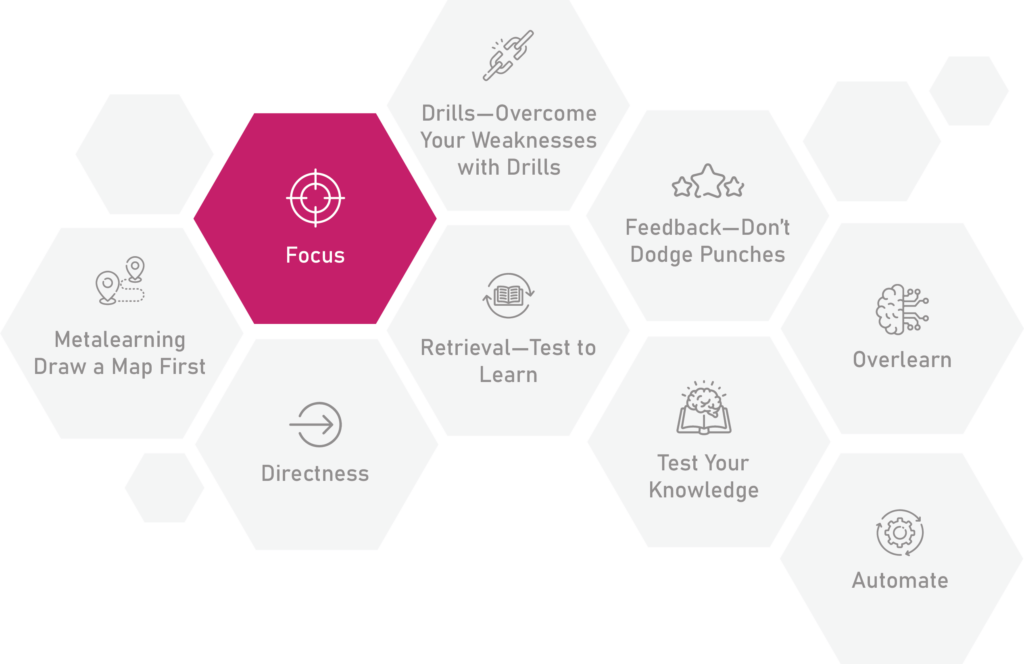
In the absence of focus, we are given freely to any form of distraction, and, to remind you, ultralearning requires full commitment to what you want to learn or the growth you seek. Apart from Scott Young’s book, other books have inspired my thoughts on focus. I admire The One Thing by Gary W. Keller, Jay Papasan, and Cal Newport’s Deep Work. This principle is about concentrating your learning on the things that will aid you the most or that will help you advance the most. You should learn how to focus on work, abandoning any tiny form of distraction. It’s a universal truth that social media is one of the core factors of distraction in this time and age. Distraction impedes performance. It limits how fast you can grow. You may be exceptionally intelligent or brilliant, but if you lack discipline and/or the ability to focus on something until you get it right, then you may get nowhere. Also, avoid procrastination. You may be thirsty for career growth, but you can’t grow and connect with the right opportunities if you are not focused and can’t maintain your balance. To maintain focus, you can do the following:
- Know your distractions: Look out for those habits that break your focus. It could be social media or binge-watching.
- Plan your learning periods.
- Set goals you can achieve in small bits.
- Learn one thing at a time.
- Reward Yourself: The human brain loves rewards, and you need to trick your brain into working first or focus first on learning, then get a reward later. The reward could take the form of a celebration of the task you completed or a hobby that you love.
- Monitor your progress.
Third Principle: Directness
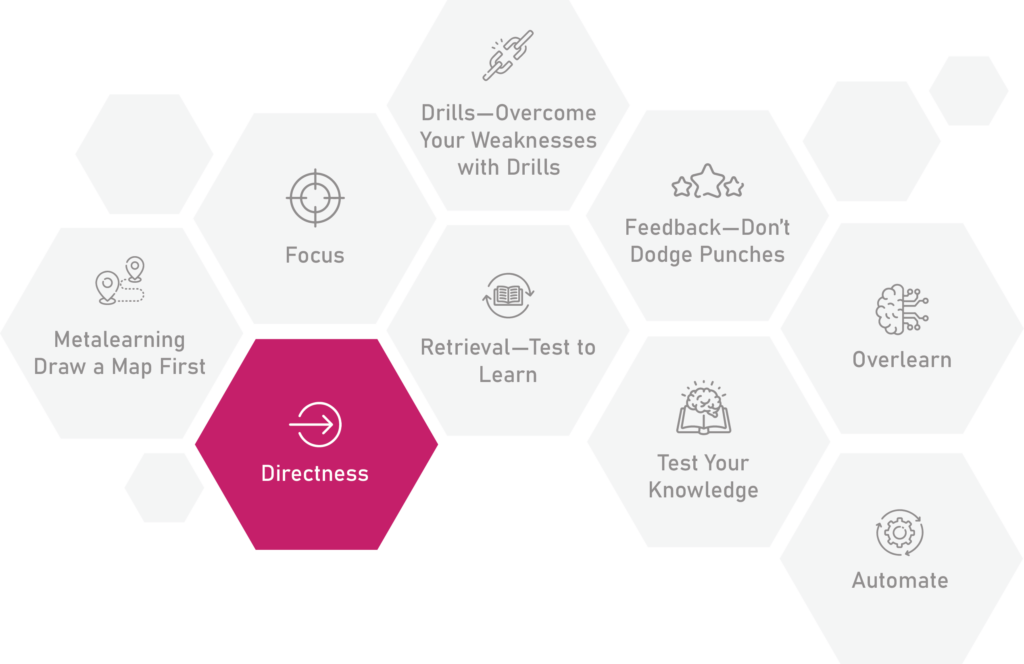
Directness implies that you learn something in the context where it’s usually applied. It means that you learn through application in real or simulated contexts. In Scott Young’s words, “Directness is the idea of learning being tied closely to the situation or context you want to use it in.” For example, you could directly learn to code by taking on small projects like building a website, rather than just learning the concepts or theories required to build a website. Human beings tend to learn things abstractly. But direct practice is what refines you to perfection. If you want to learn how to write an article, say, about HR, you shouldn’t be concerned about writing stories or reading all the articles in the world. Doing that would not help you improve. You may even get lost. The best way to learn how to write is to write. This is the goal of directness: you learn directly as you implement the skill.
Fourth Principle: Drills
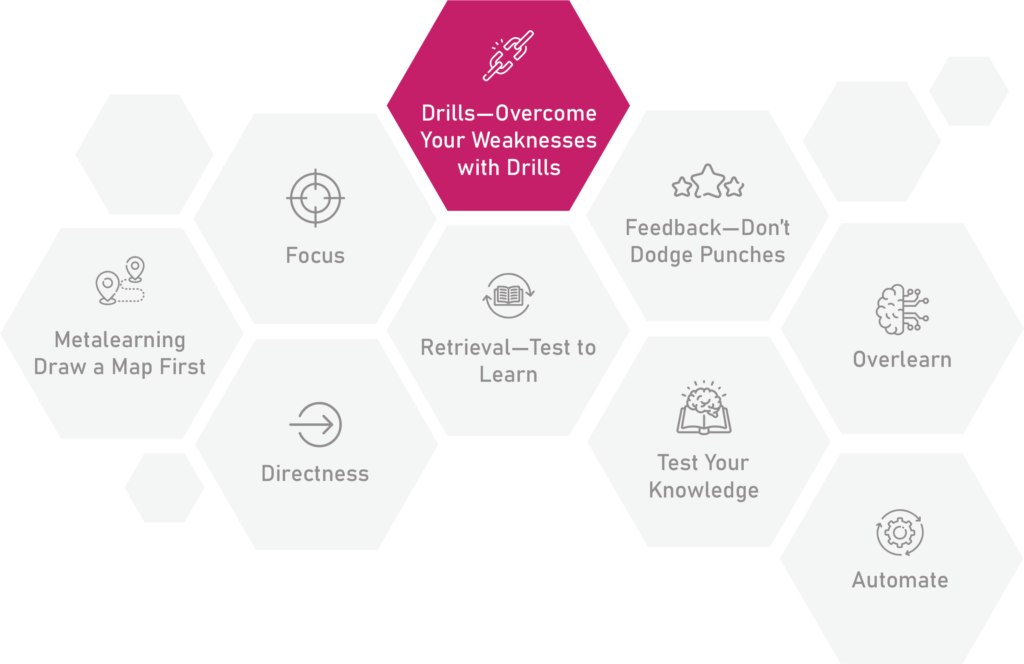
You should be aware of how the military engages in drills. This is how they train their motions. To reiterate what was earlier mentioned, your speed of work and retrieval as a software engineer is dependent upon the motions you’ve trained. Doing drills is how you train motions.
Interaction with people is motion training. From my example, before I go into any conversation, I usually have a small checklist that helps me remind myself of how to improve conversations. On that checklist, it would read: Remember to ask what is in it for them, what interests the other person has, and what interests I have to make a conversation have a more effective outcome. I consider taking off the checklist before every conversation motion. It’s a routine. I go through the checklist just to see the value of this conversation for both parties. I can make routines to practice, have someone give me feedback, or use a habit-tracking app to ensure that I go through this motion. Drills exist for motion training.
Fifth Principle: Retrieval – Use Self-Testing to Learn
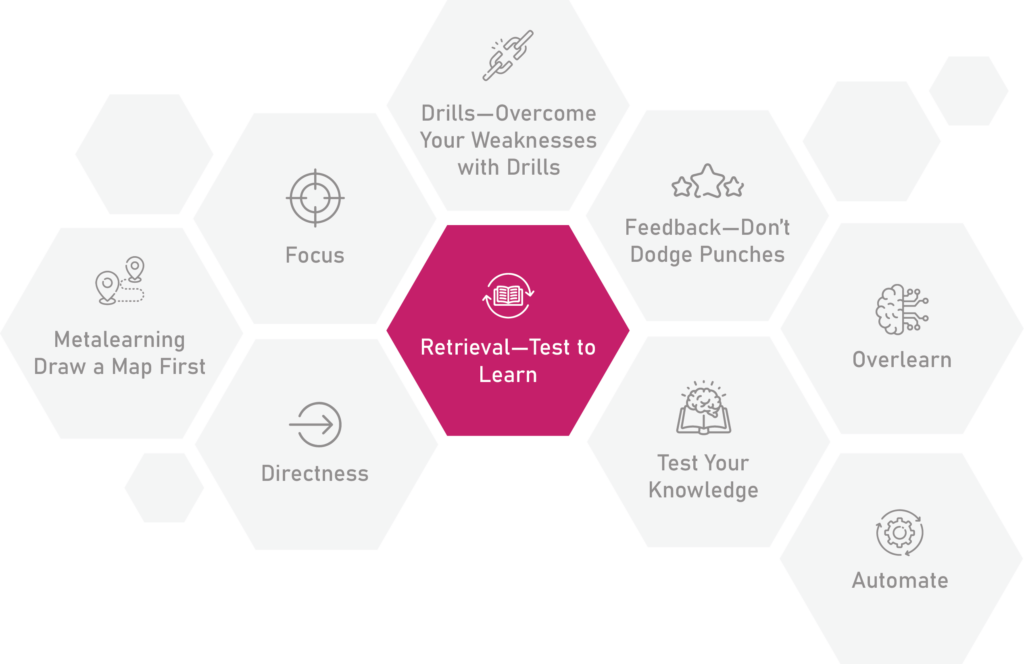
Another word for retrieval is recall. It is evident that in school, we practice retrieval; we recall the things we learn by rehearsing them continuously. Retrieval is about testing yourself on what you’ve learned. It’s a principle that requires you to recall the information you’ve assimilated. There’s one great app I can recommend for this. It is called NeuraCache. It has spaced repetition and can sync with your note-taking apps like Evernote or One Note. It puts things on repeat, just like the flashcards we used to study vocabulary in the past. You can use this app for books you read or TED Talks. You listen, you digest them, and then you repeat.
As humans, we are capable of forgetting too quickly. This is why you should recall or rehearse something until it becomes a part of your nature or until it becomes automatic. This is necessary in the sense that you gain value from implementing your learning. Value is not gained from passively watching an amazing TED Talk or being deeply inspired. The value comes from putting into practice the strategies you obtain from authors and other inspirational personalities. Retrieval is important, and it’s advantageous to have a routine of going through the things you’ve learned in the past. Rehearse them again and again until they become part of your DNA.
Sixth Principle: Feedback – Don’t Dodge Punches
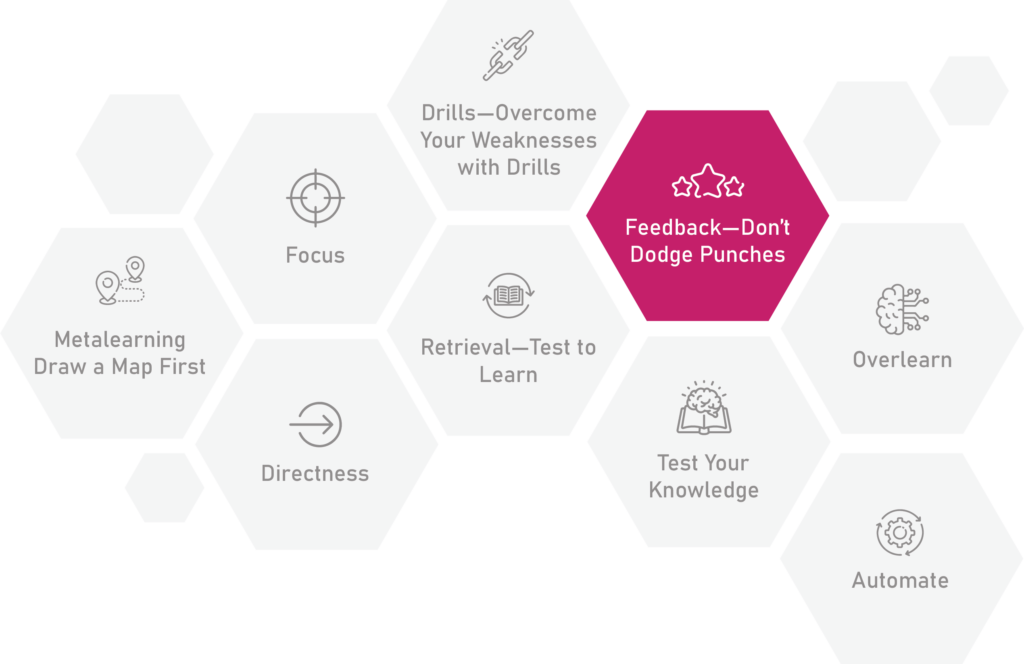
Understanding the feedback principle is important to growing yourself, especially if you migrate from another country to Germany. I mentioned in a video on “Racism in Germany” that Germans are gracious with feedback. It’s part of the mutual challenge, and they are very helpful in many cases. Don’t feel offended when you receive feedback. Lessen your ego and prepare for feedback. Prepare for the harshest feedback. Feedback is freely given opinions that can help you improve. They may be right or wrong. But the truth is this: Feedback is data. Always appreciate those who offer you feedback (data), whether you implement it later or never. To repeat, feedback is data. Feedback is the data people give you for free.
There are different forms of data in terms of feedback:
- Data on the result or outcome: An example is when you are simply told that what you’ve done did not work.
- Feedback that answers the question, “What exactly about this is not right?” (Information feedback): This informs you that something didn’t work out because a particular thing was wrong.
- Feedback for Improvement: It’s a corrective type of feedback. You’ll not only be told that your approach to something did not work out because it was wrong, but you will also have solutions prescribed to you. Try to get data from people. Go ahead and ask, “Do you have any idea how I can fix this? How can I learn this?” Gather the data you need to grow. Remember that data helps to construct a well-fitted meta-learning map. There would be no map for your learning without feedback. Make your environment feel comfortable when giving you feedback. There is no start of learning without the start of feedback.
Seventh Principle: Retention
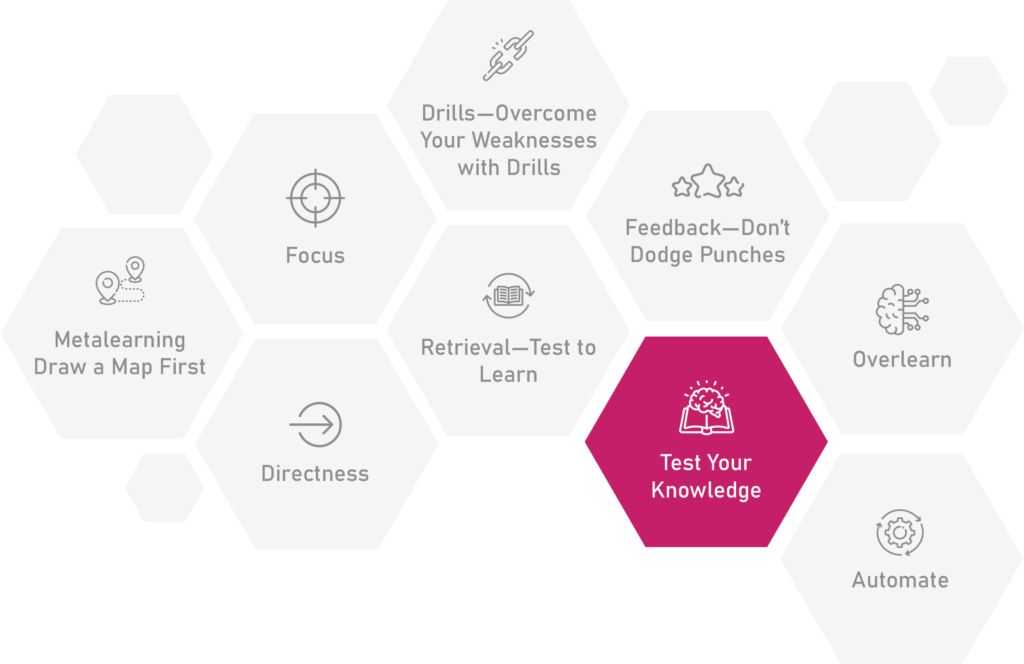
Did you know that, according to research, we forget 50% of what we learn within an hour, two-thirds by the end of the day, and 80% by the end of the month? This is why you need to understand the retention principle. It’s similar to the retrieval principle in the sense that you have a system where you go back to what you have learned and refresh it in your mind. You strive to retain, for the long term, what you’ve learned. You could practice retention by testing yourself and keeping in mind what you learn. You can retain your knowledge through regular tests. Make yourself small exams, just like they do in schools. Set yourself a milestone: by two weeks from now, you want to be able to understand a particular thing; you want to retain it. Learn for long-term purposes. To retain information, regularly engage with it as much as you can. Following this principle will help you speed up your learning.
Eighth Principle: Overlearn

Overlearning is the process of practicing something continuously until it becomes second nature. It is one method through which you can practice retention. It’s the act of doing additional practice beyond what is required for you to have a potent use of a skill. Overlearning helps you build long-term memory. You continue learning even when it seems like you have learned enough skills. You continue practicing at the same level of difficulty. Learn something until you become perfect at doing it. A concert piano player does not stop practicing the piano once he has gotten the hang of it. If he does this, his level of performance will not remain strong. At a concert, there would be adrenaline, stress, and other factors that could lower his level of performance. But a skill that has been overlearned can be performed in a less conscious state of mind. A performer who has overlearned something can even perform while sleepwalking. You should learn endlessly or continuously, even when you’re perfect. Why? It is what you’ve overlearned that you can retrieve under stress. Overlearning helps you preserve or heighten the quality of your skills.
Automate
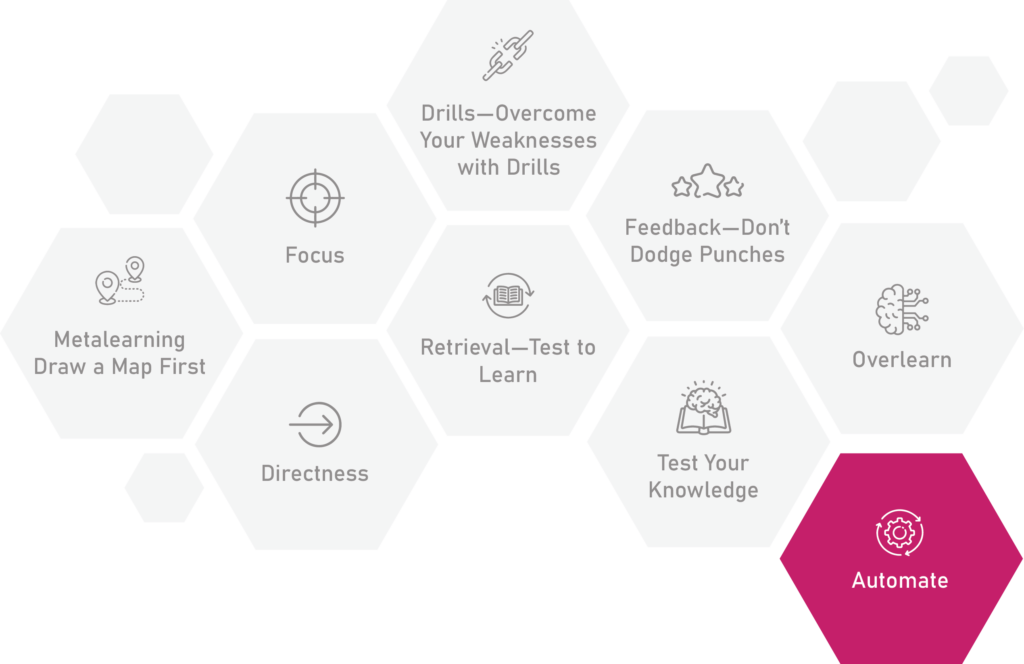
If you can act without much effort, that means it’s become automated. It has become a habit. Through learning, we build habits and the ability to do something on autopilot—that is, doing something without fully thinking about it. This is why you need to first understand the right thing to learn, because the more you practice something, the easier it becomes a habit. As a software engineer, for example, forming habits through constant learning is important for your career development. You will be able to perform tasks on autopilot. You don’t have to spend a lot of time understanding how to do something, as long as it has become a habit. It’s always beneficial to have an automated routine. This is how we build professional habits. One good example is brushing your teeth. It’s something you do on autopilot. It’s something you’ve overlearned.
My personal experience matches this. There was a time when I decided to practice gratitude and planned to make it a routine. I wanted it to become something I could do without it feeling like a big task. I wanted to think about what I was grateful for each day. Before now, I had a routine where I reflected on each day before I went to sleep. But this wasn’t automated because, at times, I got too tired and went to sleep. It was then that I thought that I needed to make this practice automated so I wouldn’t miss it. I live on the fifth floor, and the building does not have an elevator. I took this as an opportunity to go through the routine of gratitude every time I walked the stairs. The stairs became my automated anchor, and my routine of gratitude became something I did on autopilot. It became something I could do without effort, consciousness, or a waste of time.
Once you decide on the goals you want to achieve, put them on autopilot so that even when you completely forget them, they will still happen automatically.
Check your Eligibility Now!
 Register: Sign up to get started on your journey with us.
Register: Sign up to get started on your journey with us.
Watch the Videos: Videos designed to elevate your assessment performance.
Take an Assessment: Discover your unique skills with our detailed assessment.
Book your appointment: Make an appointment with us to take the next step in your journey.
More Career Planning and Development Strategies
Build Quality Relationships
One of the most important foundations for sustaining your career is quality relationships. There are three types of relationships you can build. These include:
- Relationship with Mentors: Mentors are people who are more experienced than you are. They’ve gone ahead in your career path and can help you decide how to best approach something. They have so much experiential knowledge from which you can draw ideas and make the right plans. Having relationships with mentors has proven to be a secret to success since the beginning of time.
- Mastermind Relationships: A mastermind relationship is a connection formed between people who have similar goals for personal or career development. My mastermind friends will always challenge me to do better; they will encourage me to work harder. They will support me as well as hold me accountable. Masterminds are people who help us become the best version of ourselves. They are people who hold us accountable and are not scared to give us harsh feedback that would help us become a better version of ourselves. If you don’t have people who have this quality, you will never be the best person because, as human beings, we’re prone to laziness and that is for every one of us. So we need masterminds.
How to Build Mastermind Relationships
- Relate with people who share your vision, goals, and desire for growth (career growth).
- Make space for open communication in your mastermind relationship. Don’t be hideous in sharing ideas, feedback, and challenges.
- Meet regularly with your mastermind group. This will drive focus and accountability.
- Be open to individuals from different backgrounds.
Relationship with Latent Network:
This is different from very intense relationships like mentorship or masterminds. Latent networks refer to relationships with people who are not too close to you. Despite the distance, they still have their place in your life. You could need them in moments when you need certain questions answered or opportunities enlightened. For example, you might need a lawyer or an expert on patents. You could need a solution to something that you never had in mind; it could be a recommendation for a kindergarten. We cannot determine the problems that life pushes in our direction. That’s why you need to build a latent network. In Germany, joining clubs is among the paths to tread if you want to build your latent network. If you wish to expand your knowledge of Germany’s club culture, we have published a separate piece on this, “Cultural Integration in Germany’s Club Culture.” A latent network is not an active or intense relationship with people, but you can still reach out to people as long as they have a good impression of you. It’s still a great connection. Even though it’s not close-knit, you are still comfortable in both ways to call each other once there is a need for that. This will help you resolve so many things in your life much faster. It will help you advance and grow faster.
Outwork Everyone
This is something people don’t like to hear. Everyone wants to have some hacks, shortcuts, or something brilliant that gets them ahead of the curve. That is mostly a route to failure. Identifying your vision and mission is not enough; you can only make them come alive if you outwork everyone. Learn things other people consider difficult. Keep finding innovative approaches to work, unlike anyone else. Do things you consider uncomfortable, as long as they help you improve and stay ahead.
The other day, I had a conversation with my friend from South India who runs a large-scale business. I told him how I thought it was unfair to have to work 30% harder to be considered equal just because I’m a woman. But he didn’t budge. He just said, “So,” and remained quiet. Then I convinced myself further. That’s what is required of me as a woman. I must work 30% harder. This applies to you as well. You need to cease complaining and do what is required for success and continuous advancement.
Stay Ahead of the Curve
A good professional development strategy is when you’re staying ahead of the learning curve. Stay informed about industry trends, and possible developments (things that will be needed in five years). Participate in industry events and professional associations. This is also beneficial for building your latent network. Challenge yourself outside of your comfort zone and seek out new experiences that will help you grow. You could delve into new projects, positions, or volunteer. Volunteering is helpful; it exposes you to responsibilities that can make you appear more qualified. If no one is willing to give you a leadership role within your organization, perhaps they think you lack the qualifications for it. This is why volunteering is important. Look for an organization where you can volunteer in a leadership capacity. This will allow you to learn leadership skills directly, and when you return to your job, you can showcase your leadership experience, making it easier for an employer to give you a leadership role. Volunteer and take extra engagements. It’s always about going the extra mile.
Over to You
First, remember the value of feedback. Feedback is data. You need feedback if you want to develop yourself and your career. You need feedback if you want to go in the right direction or do things right. Don’t feel disconcerted when someone offers you feedback; instead, make them feel comfortable when giving you feedback.
Another key principle to live by if you want to advance your career is outworking everyone. Transcend your limits and what others consider limitations. Do more than is expected of you as there is no smooth road to competence. You must work for it. Some people believe in the saying “Fake it till you make it.” But does that seem like a wise decision to you? Before you, there are two options: choose between being truthfully competent and pretending to be competent.
Build and nurture quality relationships. Invest your time in mentorships, mastermind relationships, and build your latent network. If you are competent in what you do, quality relationships will naturally form. People admire competence, so you will gain visibility. People will learn about you, provide you with ideas, support you, and hold you accountable.
If you want a fulfilling career life, apply these principles and strategies. Work towards self-improvement. career development is also self-development or self-improvement and constantly push yourself out of your comfort zone to avoid becoming stagnant.




